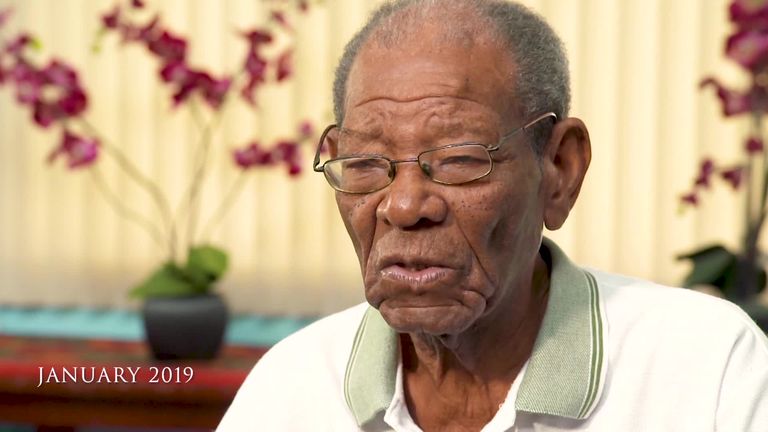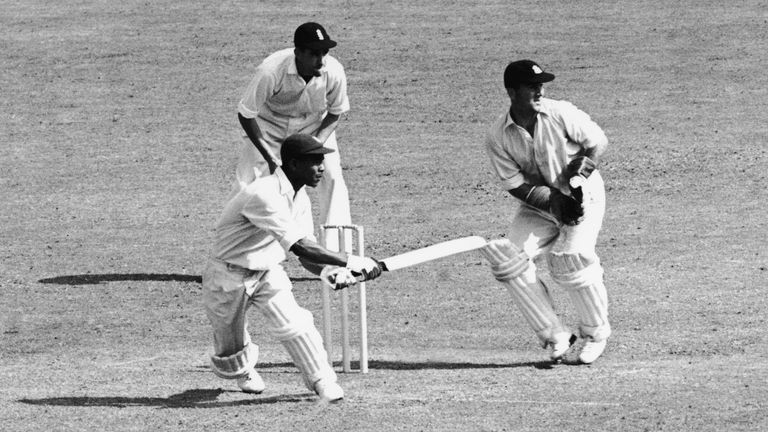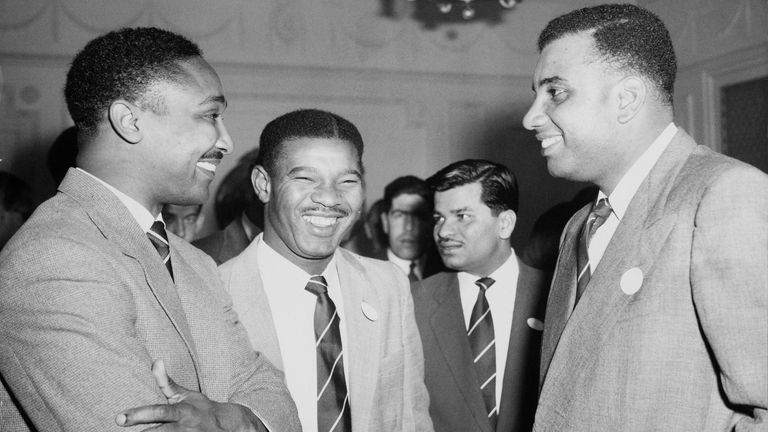Sir Everton Weekes obituary: an icon of West Indies and world cricket
Friday 3 July 2020 14:59, UK
"Everton knew how and when to destroy an opposition. He was the most marvellous player of the pull shot I ever saw and used it as his main weapon of destruction."
The late Sir Donald Bradman rated Everton Weekes in his book 'Bradman's Best' as the finest West Indian batsman he ever saw - nimble and nuclear in an age of Caribbean champions.
Weekes, who died on Wednesday at the age of 95, was the last surviving member of the famous 'Three Ws' and alongside Frank Worrell and Clyde Walcott will be forever entwined in cricketing folklore.
The trio were part of the West Indies squad which won its first Test, and indeed series, in England in 1950 - Weekes weighing in with 129 and putting on 238 with Worrell (261) as the tourists romped to a 10-wicket win at Nottingham and a lead they would not relinquish.
England had already had a taste of the greatness to come when Weekes ran up 141 in another 10-wicket mauling in his debut series in March 1948 - his sixth Test knock kickstarting a career that would span 48 Tests, producing 4,455 runs at an average of 58.61.
He wouldn't bat again in Test cricket for eight months but when he did he ran amok - scores of 128, 194, 162, 101, 90, 56 and 48 flaying India on their own patch. His sequence of five centuries on the spin remains a record that only Rahul Dravid, with four in a row in 2002, has threatened in the modern era.
England became a second home for Weekes thereafter, the Bajan joining the increasingly trodden path from the Caribbean to the North West and the thriving Lancashire League.
Sky Sports Cricket pundit David Lloyd recently recalled the impact the influx of West Indian cricketers had on the region - Wes Hall becoming Bumble's cricketing hero at Accrington Cricket Club - and Weekes was no different nor less loyal, spending seven seasons at Bacup from 1949-1958.
He scored over 1,000 runs in each season and his incredible average of 158.25 in 1954 remains a league record.
During that time he recorded his highest score on the Test stage, making 207 against India at Port-of-Spain in January 1953 and following it up with 161 two Tests later at the same ground.
In all he scored 15 Test tons and took just one wicket - opener Arthur Morris the unsuspecting victim of his very occasional leg-spin in 1955 when Weekes was thrown the ball with Australia on the brink of victory in the first Test.
Before a thigh injury hastened his international retirement in 1958 at the age of just 33, Weekes took 206 off England in Port of Spain in March 1954 and scored 123, 103 and 156 in New Zealand in 1956.
The future was already in good hands - Weekes having witnessed history in his final series as a player, watching on from the non-striker's end as Sir Garry Sobers passed 300 on his way to a then world-record score of 365, against Pakistan at Kingston.
Almost 40 years later Weekes followed Worrell and Walcott in receiving a knighthood for service to cricket, following stints as a coach, broadcaster and ICC match referee.
The Caribbean's four-day tournament continues to be played for the Headley-Weekes Trophy - named after himself and fellow batting craftsman George Headley - and, of course, Weekes' name is immortalised alongside that of Worrell and Walcott in the 3Ws Stadium near Bridgetown.
For a boy born into a poor family in February 1925, who was named after a Merseyside football team, his rise in cricket was as meteoric as his batting must have been mesmerising.
Speaking in February some eight months after suffering a heart attack, Weekes said: "I want to thank Cricket West Indies and the people in cricket for their kind words and well-wishes. I played my cricket for the people and it is very good to know they respected me. I hope I made people happy with the way I played."
If it was good enough for Bradman…








